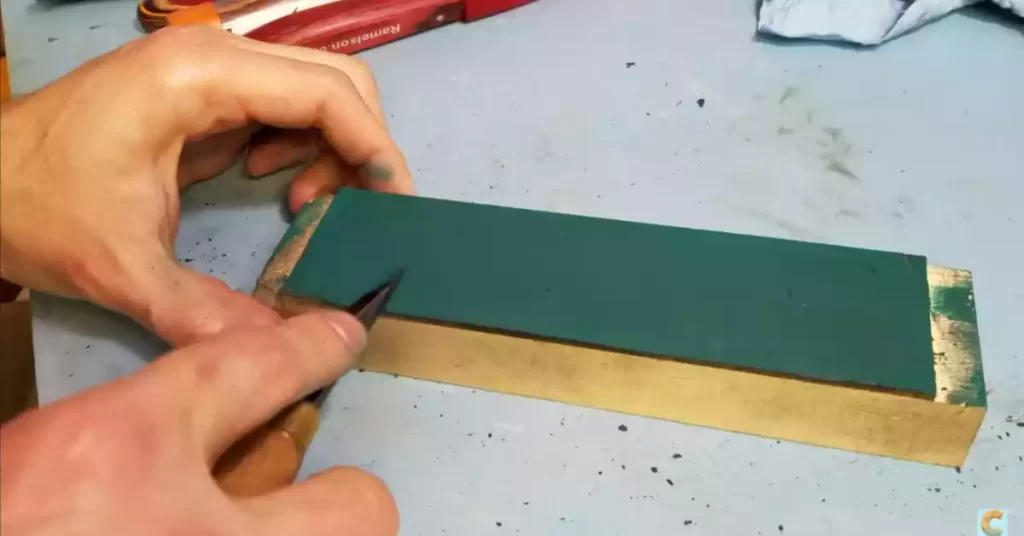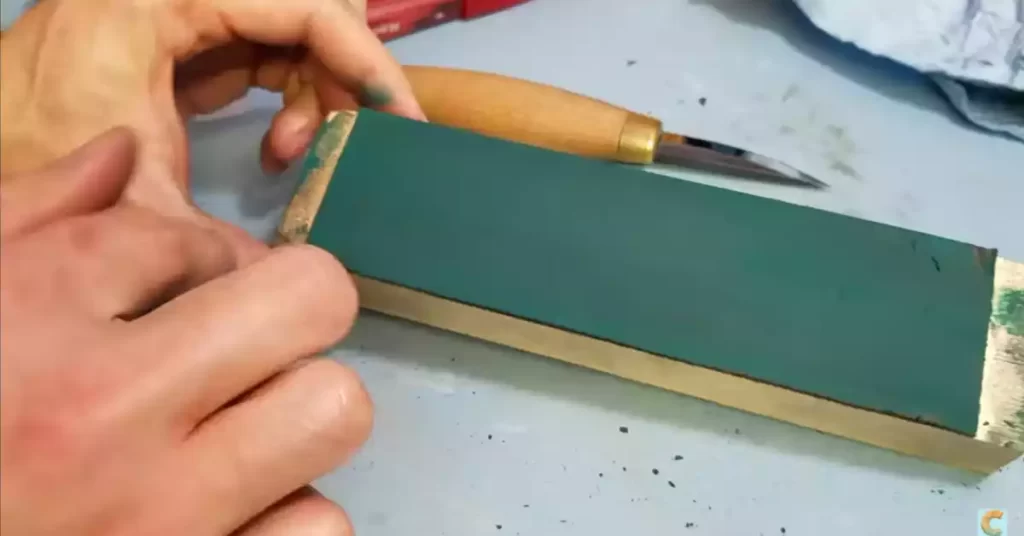Strops are a vital component of every blade-enthusiast’s maintenance kit. They keep blades sharp and ready to deliver top performance. On the flip side, strop compounds are essential for strop upkeep, enhancing the tool’s longevity and efficiency. However, a strop smothered with old compound can lose its effectiveness.
Regular cleaning of strop compound ensures optimal functionality. It maintains the strop surface smooth and receptive for fresh compound application, thus guaranteeing precise blade sharpening.
Strop cleaning, though necessary, isn’t always straightforward. It demands a detailed understanding of the compound, careful material selection, and a meticulous cleaning process. Let’s explore this nuanced maintenance task more closely.
Strop Compound: The Basics
What Is Strop Compound?
Strop compound is an abrasive substance applied on a strop to aid in sharpening tools. Different compounds offer various levels of grit, much like sandpaper, to finely tune the edge of a blade.
Why Strop Compound Needs Regular Cleaning
Cleaning strop compound is important as the compound tends to build up and harden over time. This hardened layer may decrease the strop’s effectiveness and eventually cause damage to the blade’s edge.
Preliminary Steps for Cleaning Strop Compound
Before jumping directly into the cleaning process, it’s crucial to follow some preliminary steps.
Identification of Compound Type
Identifying the type of compound on your strop is the first crucial step. Strop compounds are mainly water-based or oil-based, with each requiring a slightly different approach to cleaning.
- Water-based compounds are easier to clean as they can be washed off using warm water and a mild detergent.
- Oil-based compounds, on the other hand, require a solvent like mineral spirits for effective removal.
Having this knowledge not only makes the cleaning process smoother but also helps in preserving the quality of your strop.

Safety Measures Before Cleaning
Safety should always be a priority when dealing with sharp tools and cleaning agents.
- Ensure your working area is well-lit and free from potential hazards that may cause accidental injuries.
- Use a blade cover if available, or make sure the blade is secure and can’t accidentally harm you.
- If you’re using mineral spirits for cleaning, ensure you’re in a well-ventilated area to avoid inhaling fumes. Using gloves can also protect your skin from any potential irritation.
How to Clean Compound off a Strop
Getting down to the cleaning process, having the right materials and a clear step-by-step guide is crucial.
Strop Cleaning Materials You’ll Need
To clean a strop effectively, you’ll need a set of specific materials. These materials ensure the cleaning process is thorough and the strop remains in excellent condition after cleaning.
- A soft brush or a sponge: This aids in gently scrubbing off the compound without damaging the strop surface.
- Mild detergent or soap: This is used for cleaning water-based compounds. Opt for a gentle soap to prevent damaging the strop.
- Mineral spirits: These are essential for cleaning off oil-based compounds.
- Warm water: Warm water helps to loosen the compound and makes the cleaning process easier.
Step-by-Step Guide for Cleaning
Cleaning the strop requires a careful and detailed process.
- Preparation: Clear your workspace, ensure it’s well-lit and secure your blade if it’s still attached to the strop.
- Compound Identification: Identify whether the compound is water-based or oil-based. This will guide your choice of cleaning agent.
- Cleaning: For water-based compounds, dampen your soft brush or sponge with warm water and add a little mild detergent. Gently scrub the surface of the strop until the compound comes off. For oil-based compounds, use mineral spirits instead of water and detergent.
- Rinse and Dry: After cleaning, rinse the strop with warm water to get rid of any residual cleaning agent. Dab it with a dry towel to remove excess water and let it air dry completely.

Maintenance Tips for Strop Post Cleaning
Cleaning a strop is only part of its overall care. Proper maintenance post-cleaning is essential for its longevity and performance.
Keeping Strop Dry
Strops should always be stored dry. Any lingering moisture can degrade the leather over time and create an environment for mold growth. After cleaning and rinsing, always allow the strop to air dry completely before storing it.
Storing Strop Properly
Proper storage prolongs the life of your strop. Store your strop in a cool, dry place, away from direct sunlight or heat sources. These conditions can cause the leather to dry out and crack. It’s also best to hang your strop or lay it flat to prevent creases or folds.
Common Mistakes During Strop Cleaning
As simple as it may seem, strop cleaning can sometimes go wrong. Being aware of common mistakes can help you avoid them.
Using Wrong Cleaning Agents
Using the wrong cleaning agents can damage your strop. For instance, using a harsh detergent on a water-based compound or not using a solvent for an oil-based compound can compromise your strop’s quality.
Neglecting Regular Maintenance
Regular maintenance ensures your strop remains in top condition. Neglecting to clean your strop regularly can cause the compound to build up and harden, reducing its effectiveness.
Additional Tips for Strop Care
Beyond cleaning, there are more practices to keep your strop in excellent condition.
Regular Compound Replacement
Even with regular cleaning, compounds lose their effectiveness over time. Make a habit of replacing your strop compound regularly to maintain your blade’s sharpness.
Knowing When to Replace Your Strop
Strops don’t last forever. Despite your best maintenance efforts, there will come a time when you need to replace your strop. This could be due to wear and tear, a damaged surface, or decreased performance.
Frequently Asked Questions
How often should I clean the compound off my strop?
The frequency of cleaning depends on the usage of your strop. Generally, a monthly cleaning routine works well for frequent users, while less frequent users can extend this to every 2-3 months.
Can I use any soap for cleaning a water-based strop compound?
It’s recommended to use a mild detergent or soap to prevent any potential damage to the strop. Harsh soaps can dry out the leather, leading to cracks and decreased longevity.
Is it necessary to replace the compound on my strop?
Yes, replacing the compound periodically is necessary. Over time, the compound can lose its abrasive properties, resulting in decreased sharpening ability.
Conclusion
Cleaning the compound off a strop is a key aspect of blade maintenance. Not only does it maintain the strop’s effectiveness, but it also enhances your tool’s performance. With the right materials, a careful approach, and a clear understanding of the compound type, you can execute this task smoothly.
Post-cleaning care plays a vital role too. Proper drying and storage conditions ensure your strop stays in top condition and delivers reliable performance. Coupled with regular compound replacement and knowing when to replace your strop, these practices define an effective strop maintenance routine.
In essence, a well-maintained strop translates to well-maintained tools. By following these steps, you’re not just taking care of your strop, but you’re also ensuring your tools are always sharp, ready, and safe to use. Remember, the time and effort invested in strop care pay off in the long run, contributing to the longevity and effectiveness of your blades.
